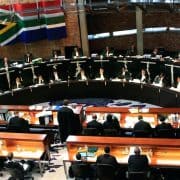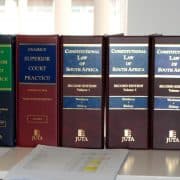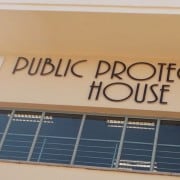|
Getting your Trinity Audio player ready...
|
What values and attributes would you like to see in your next public protector?
Many South Africans would not struggle in answering this question. This is partly because the public profile of the incumbent, Thuli Madonsela, has been raised broadly over the past few years, thanks to controversial issues investigated by her team as well as community outreach programmes aimed at informing more members of the public about her role and responsibilities.
The duties of the public protector are widely known by the general public, but Madonsela’s role has come under attack and defence for her involvement in certain public office issues. The most notable of these, arguably, is that of the cost of security upgrades at President Jacob Zuma’s Nkandla home in KwaZulu-Natal.
After her office investigated, Madonsela ruled in 2014 that Zuma had benefited unfairly from what was meant to be security upgrades to his private home. She furthered her argument by recommending that he repay a portion of the money used on the project as a show of respect for legislation that governs state spending.
An interesting Constitutional Court case, heard last week, now awaits the bench’s judgment on whether Zuma is bound by Madonsela’s recommendations and whether he violated his official obligations to uphold the Constitution.
Madonsela is preparing to bow out of her role towards the end of this year. Corruption Watch surveyed her office for opinions on the qualities that her successor should possess. We asked Madonsela’s staff to look beyond her tenure and share their “wishlist” for the incoming protector.
Staff from the national office in Pretoria as well as the smaller, provincial offices were asked to give their honest views – in questionnaire style – on the standards that make a worthy public protector.
Wanted: an individual with integrity, transparency and accountability
Integrity, transparency and accountability topped the list of values shared. These standards, one may argue, should permeate the space of a leader’s command, and extend to the organisation whose direction they influence.
A public protector, the survey further revealed, should embody qualities that not only promote good governance and social justice, but should also have a knack for investigating corruption and irregular practice in public office without bias.
As far as professional qualifications are concerned, a common prerequisite was that the public protector should have worked as a high court judge and possess a vast knowledge of the rule of law.
The views shared varied in focus from academic and practical qualifications to a good values and principles set that will command respect from all members of society. There were also wishes for someone who embodies good governance and social justice values.
The ideal professional background of the next protector, according to members of Madonsela’s staff, would be as follows:
- A judge of a high court or
- Admitted as an advocate or an attorney and has practised as an advocate or an attorney for a cumulative period of at least 10 years or
- Qualified to be admitted as an advocate or an attorney, and for a cumulative period of at least 10 years after having so qualified, has lectured in law at a university or
- Specialised knowledge of or experience, for a cumulative period of at least 10 years, in the administration of justice, public administration or public finances or
- Been, for a cumulative period of at least 10 years, a Member of Parliament.
The MP requirement was the least important, the respondents said. “We think that someone who has been an MP is probably not the right person for the job,” said Corruption Watch’s executive director David Lewis at the launch of the Bua Mzansi campaign.
The staff felt that in terms of important experience gained in the previous role, appointees who gained legal experience would be best, followed by investigative experience and then public administrative experience.
When it comes to specific important skills that the appointee should possess, the staff named good communications skills (internal and external) as tops, followed by leadership skills and then analytical skills.
The most important areas that the next public protector should know about, said the staff, are good governance and an understanding of the social justice sector, followed by guiding legislation (including the Constitution) and then objective investigation and evaluation techniques.
The most important issues the appointee should focus on during their term are first and foremost, preserving the independence of the Office of the Public Protector, followed by human capacity building and then rooting out systemic weaknesses that allow corruption to take hold.
The most important beliefs the next public protector should possess are respect for the rule of law, followed by accountability and then independence.
If nominees possess all of these qualities, or even if they possess most of them, there is a good chance that they will fit the bill.








